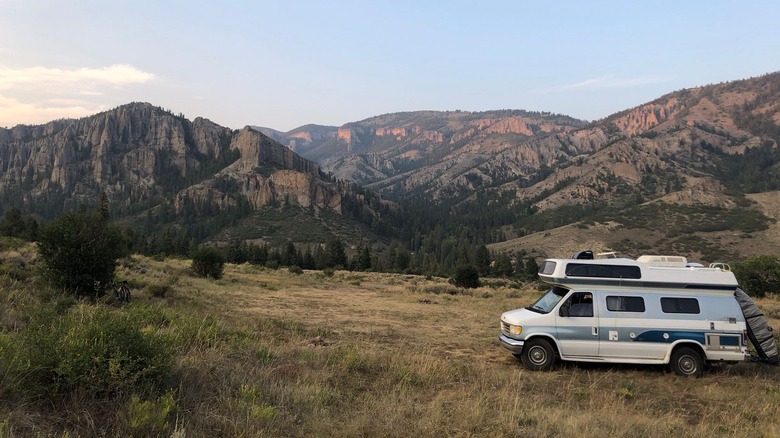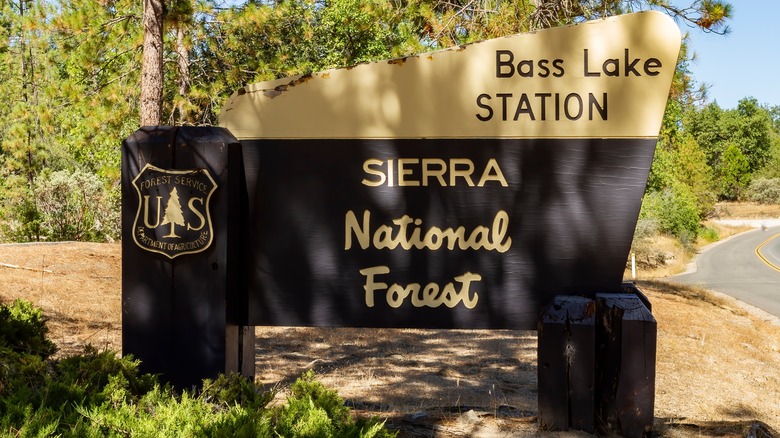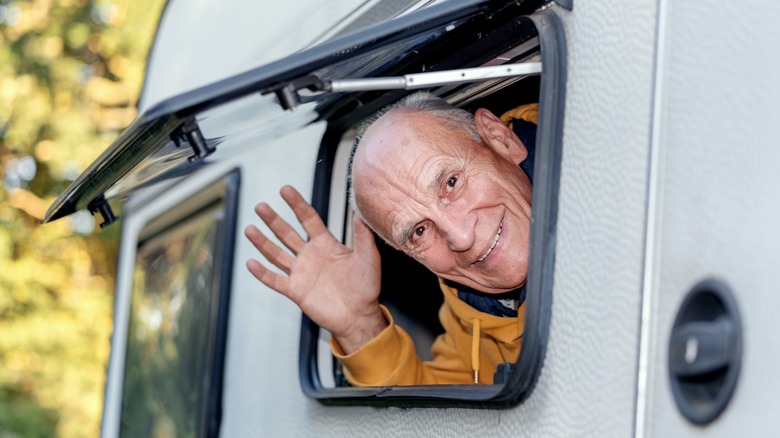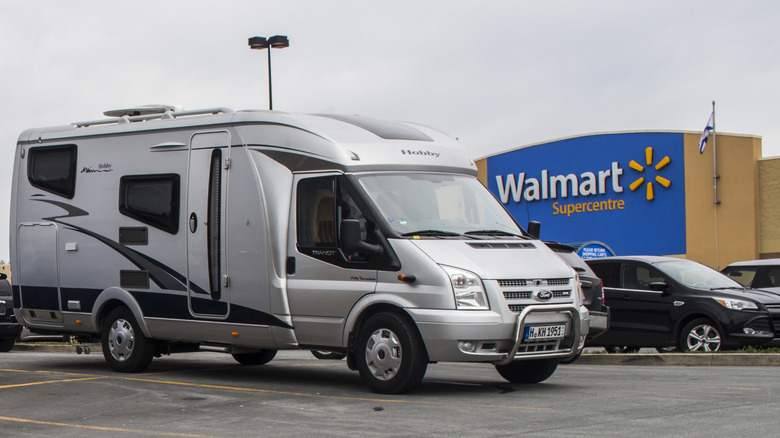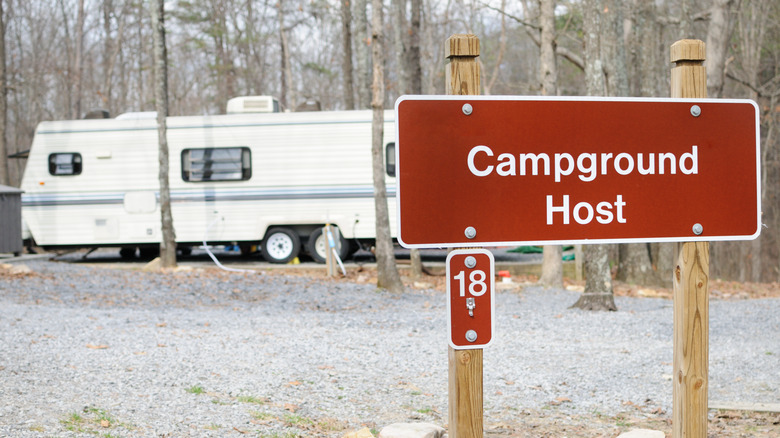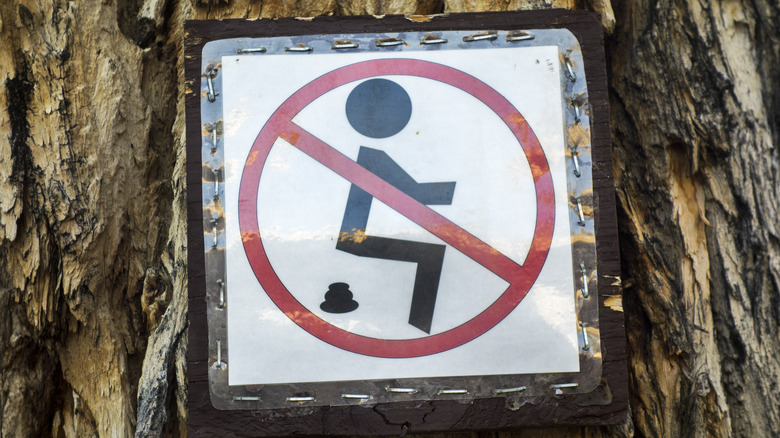Simple Tips For Parking Your RV For Free Overnight
One of the biggest reasons why van life is more expensive than you thought is paying for overnight parking. After buying an RV and filling it up with camping equipment, hitting the road no matter the gas prices, and stopping at McDonald's, you might have been surprised the first time you found out you'll still have to fork over $60 for a piece of cement.
Campgrounds and RV parks are wonderful. Kids can make friends at other sites while you get the fire going, that shore power and unlimited hot water can be an absolute lifesaver, and you can finally wash the dishes more than 6 inches away from your bedroom. Unfortunately, campground costs can quickly add up, and reservation systems can be a real thorn in the side of a van packed full of wanderlust.
The whole point of buying a self-contained home on wheels is the freedom it brings. Mainly the freedom to hit the road without booking accommodations. I've driven a class B RV across both the United States and Canada, sleeping in public lands, Walmarts, and pristine back roads all over the place along the way. My rig is far from a stealth camper, and still, the best places I ever slept were completely free. Here's how you can do the same.
Build your itinerary around public lands
The Bureau of Land Management (BLM) and the National Forest Service (NFS) maintain the two largest collections of publicly owned lands in the United States. The two departments maintain over 440 million acres of land, including large swaths that are available for up to 14 days of free camping. Traveling in an RV is all about the journey, not the destination. Going an hour out of your way to camp on public lands could be the highlight of your entire trip.
You can find spots in these areas with sweeping vistas and a sense of privacy that rivals the country's most visited campgrounds. The one catch is that these dispersed camping areas are completely off-grid. You might have a pit toilet and a picnic table nearby, but realistically, you'll be lucky to find a flat spot to park level.
The BLM and the NFS have slightly different rules and regulations regarding camping. You should familiarize yourself with the rules — which can be found on both the NFS website and BLM website – before turning your engine off. For the most part, camping is fair game as long as there is no signage posted and as long as it doesn't interfere with other official uses. These sites are first-come, first-serve, and home to some of the most amazing camping in the entire country.
Talk to strangers
You were most likely taught from a young age not to talk to strangers. However, you were probably also taught that cars are meant for driving, not living, and that turned out to be wrong on occasion. There are exceptions to every rule, and when you're trying to park your RV for free, you'll have to make exceptions to any rule that isn't specifically signposted.
There's no technique better than word-of-mouth for finding hidden gems. If you end up parking next to a few other folks in RVs, they may not mind if you respectfully start a conversation and ask for some tips, especially if you show them your rig. Ask them which direction they've come from, and try to have a spot or tip loaded in the back of your mind to help open them up.
This tip requires you to read the room or, in this case, the rig. Some people don't want to be disturbed while they're in the woods. It's cool to be a friendly neighbor, but you shouldn't knock on closed RVs or interrupt folks while they're eating. Start off with a friendly wave and howdy while passing by before marching directly into someone else's campsite.
Learn which stores allow RV parking
We all dream of nights in the woods in our RVs, but to get to the best views, you'll likely have to spend a few nights in a parking lot along the way. Places like Walmart, Bass Pro Shops, Casinos, and Cracker Barrel can be a real refuge for tired road dogs. These businesses are so important to the RV community that concerned citizens have set up an interactive online map that tracks the locations of RV-friendly storefronts (in this case, Walmart and Cracker Barrel locations). There was even a feature-length documentary made a few decades ago featuring full-time travelers with shoulder-perched parrots singing the praises of Walmart lots.
Modern campers have fewer store locations to choose from as these businesses change their rules regarding overnight camping. Walmart reports that there are currently 4,615 locations within the U.S. The most recent updates to the interactive Walmart tracker reports that roughly 1,000 of those locations no longer allow overnight parking.
Still, RV-friendly store parking lots are one of the most reliable methods for securing a free place to rest without straying too far from the interstate. We'll just have to be a bit more thoughtful of how we can pull it off. To avoid the knock, call ahead and confirm that the individual location you've identified allows camping, and don't do anything that would annoy the proprietors. That means no setting up camp outside, no fires, and no generators.
Park for free as a campground host
This tip goes out to anyone trying to spend the next few months in their RV. A lot of state park systems and private campgrounds have programs that will allow you to stay on-site for free in exchange for a few hours of work. The rules vary from campground to campground, but you should expect to park at a campground for at least two months to land the gig.
Not only does working as a campground host help you camp for free, but it's also a great way to meet new people. Your day-to-day responsibilities will include things like showing guests around, keeping things orderly, and answering questions. You'll quickly become the de facto local expert on the area, and new visitors will come to you looking for local recommendations. Plus, as Brian Gifford of CheapRVLiving explains, walking through the campsite a few times a day is a great way to stay healthy while on the road.
Just make sure you fully understand what you're getting into before you agree to the work and take down your trailer hitch. Depending on the campground, you might be tasked with maintaining the cleanliness of composting toilets.
Leave No Trace
Our last tip is the most important. Leave No Trace is a set of outdoor ethics that applies to any excursion. These rules hold regardless of whether you're sleeping in the woods or parked at a Walmart. If you clean up after yourself today, It will be much easier for you to park your RV for free tomorrow.
The National Park Service lays out the seven key principles of Leave No Trace online, in leaflets, and at campgrounds. Basically, the idea is to leave any site cleaner than it was when you got there. Nothing gets a spot shut down, and the no overnight parking sign out faster than campers leaving trash, creating more unnecessary fire pits, or not burying their poop. It is a glaring beacon of human activity even after you've left, so passersby notice someone has been staying there and mucking up the joint.
No matter where you're camping, freedom campers have a responsibility to show the land respect and guarantee the spot is available for your next trip and for the next generation. Leave no Trace should always be the second-most crucial phrase in any RV — just behind "free coffee with fill-up."
